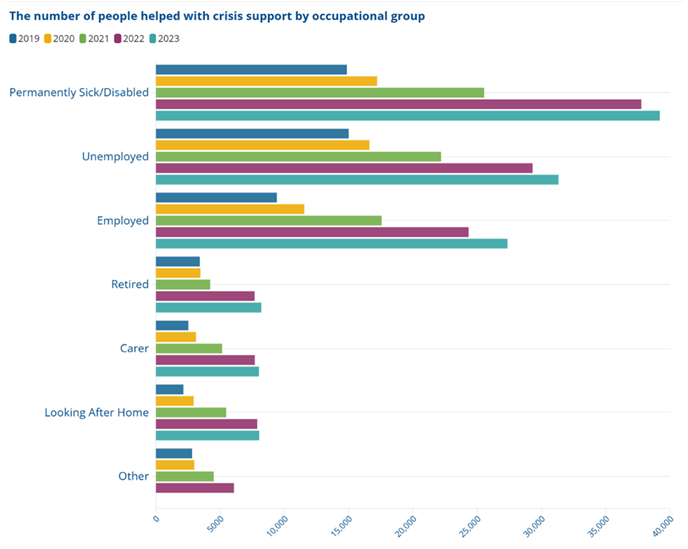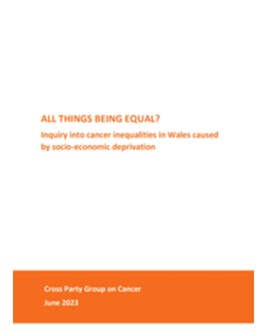Blog written by Daisy Cowley, Cardiff University
Daisy is a second-year student at Cardiff University, studying the Human and Social Science BSc degree and joined us in the Tenovus Cancer Care office over six days in January 2024 to help the policy and insight team to start to better understand the impact of the cost of living crisis on people affected by cancer in Wales.
This blog sets out the research I carried out while on placement at Tenovus Cancer Care. I discuss the effects of the cost-of-living crisis on cancer patients - and consider social-economic factors, such as poverty, and the role they play. Towards the end I’ll suggest additional lines of research that Tenovus Cancer Care can consider exploring during its policy activity.
Researching the effect of the cost-of-living crisis on cancer patients in Wales has proven difficult due to the lack of published data. The Citizen's Advice ‘cost-of-living data dashboard’ highlights some of the effects of the cost-of-living crisis on those individuals accessing Citizen’s Advice for welfare benefits advice and support. The graph below shows that in 2023 ‘Permanently sick/ Disabled’ individuals were the highest social group to seek crisis support, with nearly 40,000 individuals seeking help. The number of people needing help has increased considerably over recent years, more than doubling since 2020 – an impact of the rising cost of living.

However, ‘Permanently Sick/Disabled’ occupational group is made up of many disabilities and conditions which might include cancer, but it has not been confirmed. This suggests that although patients with medical illnesses are struggling more with the cost-of-living crisis, we cannot be certain that cancer patients are being affected as significantly. The other issue with using the Citizens Advice data is that it is a representation of the UK rather than just Wales. Citizens Advice Cymru released an article on the 28th of November 2023 discussing the effects of the cost-of-living crisis, but there was no data on illness or disability. We can, however, assume and infer from graphs such as the ‘cumulative number of people we’ve seen who’ve been unable to top up their prepayment meters each other’ that individuals with cancer would be included in the 5065 people that could not top up their meter in December 2023 however, this cannot yet be confirmed.
Research from other charities can be used to help paint a picture to allow us to better understand the effects of the cost-of-living crisis. For example, a report published by Marie Curie in 2015 considered the financial burden of terminal illness, including cancer. While this report pre-dated the cost-of-living crisis, it presents insight that terminally ill patients, including cancer patients, faced financial difficulties before the swift increase in inflation from 2022 onwards. It can be argued that patients who were already struggling before the current crisis hit now face a greater financial burden due to increased food and energy costs at a time when many people are unwell and unable to work. The report discussed the effects of financial burden on families and on cancer treatments - where patients may miss treatment cycles or doctor’s appointments due to the strain of working to pay for essentials.
 To fully grasp the effects of the cost-of-living crisis, it is important to look at social-economic deprivation. The All Things Being Equal (2023) report by the Senedd’s Cross Party Group on Cancer following their cancer inequalities inquiry – it touched upon the struggles faced by cancer patients in the face of the cost-of-living crisis. The report contained research from Cancer Research UK who found that “cancer death rates are 55% higher in the most deprived Welsh populations than the least deprived” (P.14).
To fully grasp the effects of the cost-of-living crisis, it is important to look at social-economic deprivation. The All Things Being Equal (2023) report by the Senedd’s Cross Party Group on Cancer following their cancer inequalities inquiry – it touched upon the struggles faced by cancer patients in the face of the cost-of-living crisis. The report contained research from Cancer Research UK who found that “cancer death rates are 55% higher in the most deprived Welsh populations than the least deprived” (P.14).
“Cancer incidence rates in the most deprived group in Wales are 19% higher than in the least deprived (2017-2019). It is estimated that there are around 2,000 extra cancer cases each year in Wales attributable to deprivation. That’s more than 5 extra new diagnoses per day that could be avoided if the rates of cancer in sites where it is higher for the most deprived were the same rates as for the least deprived. Lung cancer contributes half of these extra cases, with almost 1,000 extra cases linked to lung cancer being more common in more deprived populations.”
The inquiry heard concerning evidence that “(welfare benefit) support is no longer only requested by those in receipt of benefits, but increasingly by people in work who are still struggling to make ends meet….we heard too many examples of where this has affected people’s experiences of cancer.”.
Recent research in this space was published in August 2023. and concludes that this is an under-researched area of study, validating our recent experience informing this blog. We recommend further quantitative and qualitative research – drawing on publicly available datasets, surveying, and interviewing cancer patients (and people affected by cancer). A better understanding of the scale of the problem will help inform the development and delivery of urgent policy action by the relevant agencies to support people experiencing financial distress as result of their cancer diagnosis.
About Daisy
I am a second year student at Cardiff University, studying the Human and Social Science BSc degree. The degree is accredited by the British Psychology Society, with the main focus on social psychology such as identity and neuropsychology. I also had the opportunity to pick some optional modules and I chose to study social policy and victimology. An interesting fact is that this degree is the only one in the country, which means no one actually knows what is involved in it or how psychology focused it is. During my time at University, I play netball for the school of Social Science which I absolutely love and because of that love, I have stepped into the role of vice president for the society. I am also going on a two week volunteering trip to Uganda in July to build a playground for children.
During my placement at Tenovus Cancer Care I would like to learn the dynamics of working in an office, as well as the day to day jobs that people do. I find social policy extremely interesting, so having a placement that works on changing social policy to help cancer patients really suits my interests and passions. I would like to develop my skills of graph reading, in order to come up with cause and effect explanations for how the cost of living crisis is negatively effecting cancer patients. I look forward to meeting new people and starting to learn what life could be like after graduation.


